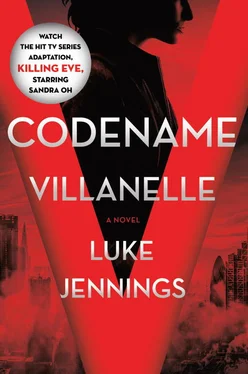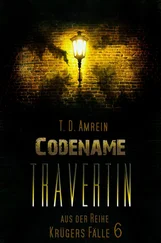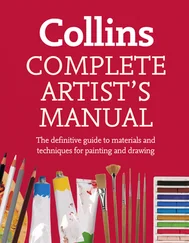Villanelle looks out over the city. To the left, the Eiffel Tower is silhouetted against the evening sky. To the right is the dark mass of the Tour Montparnasse. She considers Greco. Sets his personal refinement against the baroque horror of his actions and commissions. Is there any way she can turn this contradiction to her advantage?
She re-reads the document file, scanning each sentence for a possible entrée. Greco’s principal residence, a farmhouse in a hill-village outside Palermo, is a fortress. His family lives there, protected by a loyal and vigilant team of armed bodyguards. His wife, Calogera, rarely leaves home; his only daughter, Valentina, lives in a neighbouring village, where she is married to the oldest son of her father’s consigliere . The region has its own dialect and a history of obdurate hostility to outsiders. Those whom Greco wishes to meet—allied clan members, prospective associates, his tailor, his barber—are invited to the farmhouse, where they are searched, and if necessary disarmed. When Greco leaves home to visit his mistress in Palermo, he is invariably accompanied by an armed driver and at least two bodyguards. There appears to be no predictable pattern to these visits.
One document in particular, though, interests Villanelle. It’s a five-year-old press cutting from the Italian newspaper Corriere della Sera reporting a near-fatal accident sustained by one of the paper’s own journalists in Rome. According to Bruno De Santis: “I was coming out of a restaurant in Trastevere when a car came racing towards me on the wrong side of the street. The next thing I knew, I was in hospital, lucky to be alive.”
De Santis’s none-too-subtle suggestion is that this attempt on his life is the consequence of a piece he wrote for the Corriere a month earlier, about a young Sicilian soprano named Franca Farfaglia. In the piece, he criticised Farfaglia for having accepted a donation towards her studies at the La Scala Theatre Academy in Milan from Salvatore Greco, “the notorious organised crime boss.”
It is a brave and perhaps foolhardy piece of journalism, but Villanelle is not interested in De Santis. Instead, she wonders what inspired Greco’s generosity towards Farfaglia—not that he couldn’t afford an infinity of such gestures. Was it a love of opera, the wish to help a talented local girl to achieve her potential, or an altogether more basic desire?
An Internet search produces a wealth of images of Farfaglia. Commanding in appearance, with proud, severe features, she looks older than her twenty-six years. Several of the images reappear on the singer’s own website, where there’s a history of her career to date, a selection of performance reviews, and her schedule for the next few months. Scrolling through the engagements, Villanelle pauses. Her eyes narrow, and she touches a fingertip to the scar on her lip. Then, clicking on the hyperlink, she brings up the website of the Teatro Massimo in Palermo.
Oxana’s training took the best part of a year.
The worst came first. Six weeks of fitness training and unarmed combat on a lonely, wind-scoured stretch of the Essex coast. She arrived in early December. The instructor was a former Special Boat Service instructor named Frank, a knotty, taciturn figure of about sixty, with a gaze as cold as the North Sea. His habitual get-up, worn in all weathers, was a faded cotton tracksuit and a pair of old tennis shoes. Frank was merciless. Oxana was underweight and in poor condition following her months in the Dobryanka remand centre, and for the first fortnight the interminable runs across the marshes, with the sleet whipping at her face and the greasy coastal mud sucking at her boots, were torture.
Determination kept her going. Anything, even death from exposure on the mudflats, was better than returning to the Russian penal system. Frank didn’t know who she was, and didn’t care. His brief was simply to bring her to combat readiness. For the duration of the course she lived in an unheated Nissen hut on a mud-and-shingle island linked to the mainland by a quarter-mile-long causeway. During the Cold War, the place had been an early warning station, and something of its grim, apocalyptic purpose lingered.
On the first night Oxana was so cold she couldn’t sleep, but from then on exhaustion took its toll, and she was wrapped in her single blanket and dead to the world by 9 p.m. Frank kicked the corrugated-iron door open every morning at 4 a.m. before tossing her the day’s rations—usually a plastic canteen of water and a couple of tins of processed meat and vegetables—and leaving her to pull on her T-shirt, combat trousers and boots, invariably still sodden from the day before. For two hours they ran repeated circuits of the island, either across the oozing grey mudflats or along the icy tideline, before returning to the Nissen hut to brew tea and heat up a mess-tin of rations on a small hexamine stove. By sunrise, they would be outside again, pounding the mudflats until Oxana was vomiting with fatigue.
In the afternoons, as the darkness closed in, they worked on hand-to-hand combat. Over the years Frank had taken elements of ju-jitsu, street-fighting and other techniques and refined them into a single discipline. The emphasis was on improvisation and speed, and practice sessions were often conducted knee-deep in the sea, with the mud and shingle shifting treacherously beneath their feet. Realising that her English was poor, Frank taught by physical example. Oxana thought she knew a thing or two about fighting, having learnt the basics of the Systema Spetsnaz from her father, but Frank seemed to anticipate every move she attempted, deflecting her blows with casual ease before pitching her, yet again, into the icy seawater.
Oxana didn’t think she’d ever hated anyone as much as she hated the ex-SBS instructor. No one, even in the Perm orphanage or the Dobryanka remand unit, had so systematically belittled and humiliated her. Hatred became a simmering rage. She was Oxana Borisovna Vorontsova, and she lived by rules that few would even begin to understand. She would beat this angliski ublyodok , this donkey-fucker, if it killed her.
Late one afternoon in the final week they were circling each other in the incoming tide. Frank had a Gerber knife with an eight-inch blade, Oxana was unarmed. Frank moved first, swinging the oxidised blade so close to her face that she felt the breeze of its passing, and in response she ducked under his knife-arm and hammered a short-arm punch into his ribs. It stopped him for a second, and by the time the Gerber came slicing back she was out of reach. They danced back and forth, and Frank lunged for her chest. Her body outraced her brain. Half-turning she grabbed his wrist, wrenched him in the direction to which he was already committed, and booted his legs from under him. As Frank fell backwards into the water, arms flailing, she was already lifting her knee to stamp his knife-hand into the shingle—“Control the weapon, then the man” her father had always told her—and as the instructor involuntarily released the Gerber, fell forwards to pin him underwater. Straddling him, she forced his head back with the palm of her hand, and watched the agonised working of his face as he began to drown.
It was interesting—fascinating, even—but she wanted him alive to acknowledge her triumph, so she dragged him onto the shore, where he rolled onto his side and retched up gouts of seawater. When he finally opened his eyes, she was holding the point of the Gerber knife to his throat. Meeting her eyes, he nodded in submission.
A week later, Konstantin came to collect her, looking her up and down with quiet approval as she waited, rucksack slung loosely over one shoulder, on the muddy track leading to the causeway. “You look good,” he said, his flat gaze taking in her newly confident stance and windburned, salt-blistered features.
Читать дальше












